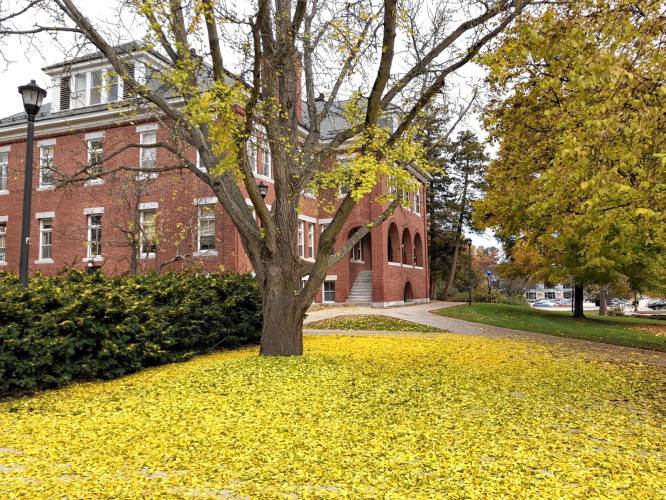This year, a ginkgo tree at UNH lost its leaves later than ever

A ginkgo tree in front of James Hall, which houses the Department of Natural Resources at the University of New Hampshire, is losing its leaves later each year. Courtesy University of New Hampshire
| Published: 11-24-2023 4:00 PM |
Ginkgo trees have a habit of dropping their leaves all in one day.
“It's very stunning and spectacular,” said Serita Frey, a professor in the Department of Natural Resources at the University of New Hampshire. “It always happens after a hard frost on a clear day, and the leaves are golden and they rain down.”
There’s one such ginkgo tree outside of the University of New Hampshire building that houses Frey’s department. It was planted about 90 years ago, and students compete each year to guess which day it will drop its leaves.
As climate change warms the atmosphere, that day is getting later each year.
Frey started at the University of New Hampshire in 2002. One day, she opened a drawer in her office and found a type-written record of the dates the leaves on the ginkgo tree fell each fall — a record not only of the competition but of the way New Hampshire’s seasons have changed in the last four decades.
This year, Frey said, was a new record: the latest leaf drop in 46 years.
“In the late ’70s, the leaves were falling on average either on or before October 25th,” she said. “For the last 10 years they've been dropping after November 1st, with November 12th this year being the latest.”
Frey said the ginkgo tree is emblematic of how climate change is playing out in New England. The trigger for the tree to drop its leaves is a hard frost — an overnight temperature of around 25 degrees.
Article continues after...
Yesterday's Most Read Articles
 Concord solidifies plan to respond to homelessness
Concord solidifies plan to respond to homelessness
 Lawyers and lawmakers assert the Department of Education is on the verge of violating the law
Lawyers and lawmakers assert the Department of Education is on the verge of violating the law
 A May tradition, the Kiwanis Fair comes to Concord this weekend
A May tradition, the Kiwanis Fair comes to Concord this weekend
 Despite using federally funded math coaches, Concord test results are mixed
Despite using federally funded math coaches, Concord test results are mixed
 Concord planning board approves new casino zoning
Concord planning board approves new casino zoning
 On the trail: Biden back to N.H. next week
On the trail: Biden back to N.H. next week
“Those frost dates are coming later and later,” Frey said.
In New Hampshire, human-caused climate change is driving springs to start earlier and falls to start later. Fall and winter are warming fastest in New Hampshire, according to a statewide climate assessment released last year.
“The tree is this visual kind of iconic symbol, if you will, of this slow march towards warmer years and longer growing seasons,” Frey said.
Seven students guessed the drop date correctly this year. They’ll each receive a fanny pack as a prize. Frey said the tree is a helpful teaching tool, and the competition is a nice way to illustrate the way frost dates are changing.
But it’s also a melancholy reminder, on the walk to class, that New England’s climate is changing.
These articles are being shared by partners in The Granite State News Collaborative. For more information visit collaborativenh.org.







 Boys and Girls Club denies culpability in sexual abuse lawsuit
Boys and Girls Club denies culpability in sexual abuse lawsuit Granite Geek: A museum about N.H. telephones is a whole lot more
Granite Geek: A museum about N.H. telephones is a whole lot more  Hometown Hero: Hopkinton PE teacher Jordan Whitaker ran the Boston Marathon as support runner for para-athlete
Hometown Hero: Hopkinton PE teacher Jordan Whitaker ran the Boston Marathon as support runner for para-athlete Barrington entrepreneur giving new life to single-use plastic
Barrington entrepreneur giving new life to single-use plastic
